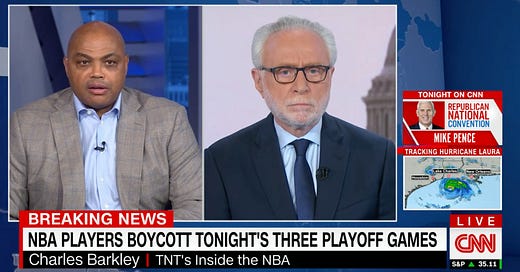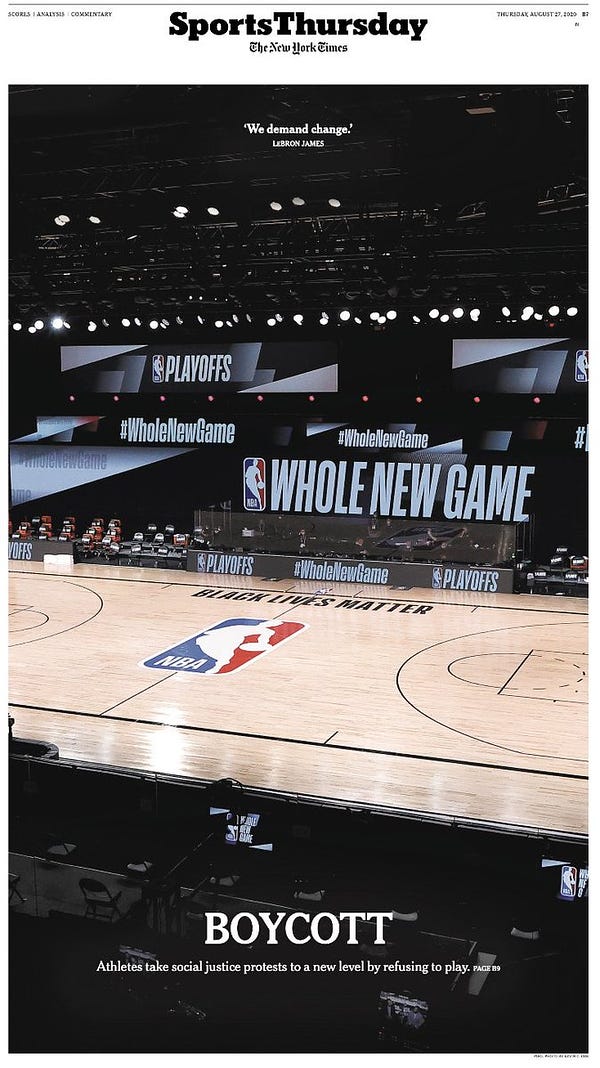Why They're Not Calling It a Strike
Acknowledging that most of us are workers and workers can withhold their labor is a stark challenge to the status quo. It also doesn't happen all that often.
Wednesday was an unprecedented day that will go down in sports—and American—history. In response to the police shooting of Jacob Blake in Kenosha, WI, NBA players went on strike, postponing the playoffs. WNBA players also refused to play, with the Washington Mystics showing up to their scheduled game with seven bullet holes painted on their backs (a reference to the seven times Blake was shot). Games in Major League Baseball, Major League Soccer, and tennis were also called off due to strikes. (Since then, NBA players have said they would return to play, though Thursday’s games are also reportedly being postponed.)
This is a staggering feat, one where if you squint, you can begin to see how a general strike could unfold. Some of the most recognizable faces in the country asserted their rights as workers; reminding most of the country that LeBron James, as highly paid as he is, is still a person whose labor is used to turn a profit, is no small thing in an era where organized labor is severely hobbled.
And so, the powers that be—in this case, the establishment media—dropped the ball (pun not intended, I promise), widely characterizing these strikes as “boycotts.” (In case you’re not clear on the distinction: A boycott means withholding your purchasing dollars as a political exercise, whereas a strike is withholding your labor.) Most notable among the “boycott” crowd were The New York Times, as ever looking for a pat on the back for what they should view as an egregious factual error, and ESPN, which, in an odd viral tweet, framed all these games being “boycotted or postponed” as if by a force of nature, rather than the work and the will of people:

I think there are two feasible explanations for this framing, one of which is a bit more charitable. My first reading—and, I’d assume, that of many people who read this site—is that this was willful obfuscation on the media’s part. As a phantom limb of the state, the elite media has a vested interest in keeping the peace, and blaring STRIKE!!!! alongside photos of James’ face would ruffle a lot of feathers and generally make people feel a lot less stable during a moment when nothing is. It also might allow people’s minds to wander to the logical conclusion that if elite athletes can go on strike, even if it goes against their contracts, then theoretically anyone could.
Another explanation—I’m allowing both to be true—is that our country is so deeply divorced from the legacy of strong unions and workers empowered to fight for their rights that we don’t even allow for the rhetorical possibility anymore. As lawmakers have sought to chip away at union rights since the New Deal enshrined them, it’s been a smart, fairly recent sleight of hand for neoliberals to push for Americans to view ourselves as “consumers,” not workers, first. Workers have the power to organize against capital and wield collective power, so it’s in the interest of the powerful for us to internalize politics, cut off from the knee of any broader movement.
That’s why we hear so much noise about boycotts: If, say, supporting Black Lives Matter is as simple as shopping at this grocery store as opposed to another one, it’s within your personal power to feel like you’re influencing politics. True boycotts can be powerful, but framing political change as a consumer choice rather than something we must forcefully demand from our elected officials conveniently lets them off the hook when they do nothing. It also further atomizes us when solidarity is what we need most.
With all that working against us, Americans could be forgiven for not immediately seeing these actions as strikes, let alone a labor issue. But this is a real opening for labor in this country to grab control of the narrative and use it to build power—and we can’t afford to waste this moment.









I agree media should have done more to clarify strikes vs. boycotts (as the LA Times did) but the players were calling it a boycott in nearly all of their statements (the Bucks players statement, LeBron's Instagram post). That's probably because of their collective bargaining agreement that bans strikes. Writers should have pointed out the difference between what was happening and the terminology being used, but I understand why the Times was repeating the terminology the players themselves were using to describe their protests.
Thank you for this smart perspective. Eat the rich.